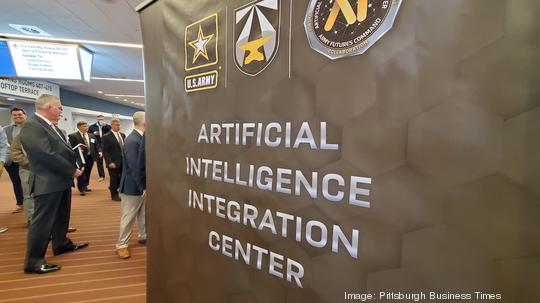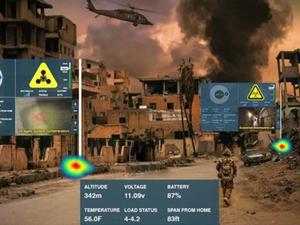
Military officials with the Pittsburgh chapter of the Association of the United States Army (AUSA), a nonprofit professional association of the U.S. Army, hosted an Artificial Intelligence + Autonomous Systems Symposium & Exposition event at the David L. Lawrence Convention Center on Tuesday and Wednesday.
The two-day event, attended by about 300 people, offered insights into the role that AI and other advanced technologies are playing in the Army's modernization efforts. It also served as a more public launch of sorts for the Army's Pittsburgh-based Artificial Intelligence Integration Center, an endeavor built upon an initial pilot at Carnegie Mellon University as well through the robotics and AI communities in Pittsburgh and Austin, Texas. The center now aims to connect the Army with the broader AI community by directly engaging with universities and companies across the country.
Dr. Doug Matty serves as the director of the U.S. Army AI Integration Center. He holds a doctorate degree in engineering systems from the Massachusetts Institute of Technology, two master's degrees (one in applied mathematics and another in national securities studies) from the U.S. Army War College and a bachelor's degree in computer engineering from the United States Military Academy at West Point.
Matty said that three years ago, the Army changed how it went about its modernization efforts. It established its Army Futures Command (AFC), a four-star general command in Austin, Texas, to look into various technologies and the opportunities they could bring to the Army as those efforts related to AI.
But Matty said it soon became apparent that this command wouldn't suffice as a one-stop location for all things AI and modernization given that other areas in the country proved to have already built more depth and thought leadership in the field.
"At that time, the decision was made that while the headquarters was being stood up there and we had these cross-functional teams that were focused on the top priorities for modernization for the Army, they perceived that AI had an opportunity to be located in a place where we could pull together all the synergy," Matty said. "As you looked across where those areas were, Pittsburgh was outstanding, both from a research standpoint as well as the growing tech industry with a number of startups as well as acquisitions by well-known tech companies. That was really what drove the decision to kind of explore this."
The Army's AI Task Force started those efforts, which lasted a few months. It ended up being such a success that it led to the formation of the AFC's U.S. Army AI Integration Center, which Matty said the Army established on paper in 2018 but ceremoniously launched in February 2019. By March 2020 and at the same time that the Department of Defense implemented its Covid-19 mitigation efforts, Army leaders came to Pittsburgh to give the center its final send-off and direction to function.
"What that did and this is why I say timing is everything because they were able to make that decision at that time, it really allowed us to work during this recent time where a lot of places were shut down," Matty said. "We were able to work and get things in place so that now as things are really starting to open up and business is starting to be conducted, etcetera, we're in a position where we can really move forward fast because all the right pieces are in place here in Pittsburgh to accelerate and go for it."
Since then and as part of its joint relationship with CMU, the center is now readying over the next few weeks to graduate its first cohort of 20 military officers and five civilians with either degrees in data engineering or data science. The center, which is spread across several facilities around Pittsburgh, employs about 45 workers. Upon the graduation of several more cohorts in the years to come, Matty said the center will have 300 working within it on a more long-term scale.
Getting to show the potential that the center can have in a more public setting via an event like this one has been beneficial, Matty said.
"Part of what's great about this type of event is I can reach out across the Army and pull folks from across the country together to have these kinds of discussions and share not only some of the good news that they have, but also share some of their challenges," Matty said. "While this serves as a great catalyst to help bring those together, the next steps are what the results are. So we're working pretty hard to capture all of those discussions and the dynamics so that we can lay out that plan and say, here's where we're going to be…I think for folks to come travel across the country, come here and interact the way that we're seeing them interact, it tells us we're ready to take off for the next big step, which will be the acceleration across a number of different areas."
Michael Ertmer, AUSA Pittsburgh's event leader for the symposium, echoed Matty's statements while also highlighting Pittsburgh's strengths in AI.
"The Army very wisely chose to put (the center) in Pittsburgh because this is the center of the activity and to really embed with the ecosystem," Ertmer said. "This is one of the first steps to really engage with the ecosystem because in a lot of ways, the Army doesn't want just the traditional players, just the usual suspects. When I was in the Army in the 90s, we had mobile phones, civilians didn't. Or if you look at some of the CEOs we've started to engage with from the autonomous car companies, a lot of them literally started their career in (National Robotics Engineering Center) working on Army or DARPA projects."









